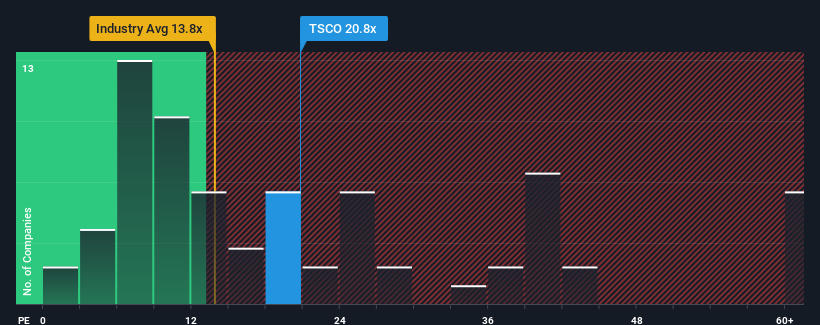- United States
- /
- Specialty Stores
- /
- NasdaqGS:TSCO
Some Shareholders Feeling Restless Over Tractor Supply Company's (NASDAQ:TSCO) P/E Ratio

With a price-to-earnings (or "P/E") ratio of 20.8x Tractor Supply Company (NASDAQ:TSCO) may be sending bearish signals at the moment, given that almost half of all companies in the United States have P/E ratios under 16x and even P/E's lower than 9x are not unusual. Although, it's not wise to just take the P/E at face value as there may be an explanation why it's as high as it is.
With its earnings growth in positive territory compared to the declining earnings of most other companies, Tractor Supply has been doing quite well of late. The P/E is probably high because investors think the company will continue to navigate the broader market headwinds better than most. If not, then existing shareholders might be a little nervous about the viability of the share price.
See our latest analysis for Tractor Supply

Does Growth Match The High P/E?
The only time you'd be truly comfortable seeing a P/E as high as Tractor Supply's is when the company's growth is on track to outshine the market.
If we review the last year of earnings growth, the company posted a worthy increase of 11%. This was backed up an excellent period prior to see EPS up by 61% in total over the last three years. Therefore, it's fair to say the earnings growth recently has been superb for the company.
Looking ahead now, EPS is anticipated to climb by 6.2% per year during the coming three years according to the analysts following the company. That's shaping up to be materially lower than the 12% per year growth forecast for the broader market.
In light of this, it's alarming that Tractor Supply's P/E sits above the majority of other companies. Apparently many investors in the company are way more bullish than analysts indicate and aren't willing to let go of their stock at any price. Only the boldest would assume these prices are sustainable as this level of earnings growth is likely to weigh heavily on the share price eventually.
The Key Takeaway
While the price-to-earnings ratio shouldn't be the defining factor in whether you buy a stock or not, it's quite a capable barometer of earnings expectations.
Our examination of Tractor Supply's analyst forecasts revealed that its inferior earnings outlook isn't impacting its high P/E anywhere near as much as we would have predicted. When we see a weak earnings outlook with slower than market growth, we suspect the share price is at risk of declining, sending the high P/E lower. Unless these conditions improve markedly, it's very challenging to accept these prices as being reasonable.
And what about other risks? Every company has them, and we've spotted 1 warning sign for Tractor Supply you should know about.
Of course, you might also be able to find a better stock than Tractor Supply. So you may wish to see this free collection of other companies that have reasonable P/E ratios and have grown earnings strongly.
Valuation is complex, but we're here to simplify it.
Discover if Tractor Supply might be undervalued or overvalued with our detailed analysis, featuring fair value estimates, potential risks, dividends, insider trades, and its financial condition.
Access Free AnalysisHave feedback on this article? Concerned about the content? Get in touch with us directly. Alternatively, email editorial-team (at) simplywallst.com.
This article by Simply Wall St is general in nature. We provide commentary based on historical data and analyst forecasts only using an unbiased methodology and our articles are not intended to be financial advice. It does not constitute a recommendation to buy or sell any stock, and does not take account of your objectives, or your financial situation. We aim to bring you long-term focused analysis driven by fundamental data. Note that our analysis may not factor in the latest price-sensitive company announcements or qualitative material. Simply Wall St has no position in any stocks mentioned.
About NasdaqGS:TSCO
Tractor Supply
Operates as a rural lifestyle retailer in the United States.
Established dividend payer with acceptable track record.


